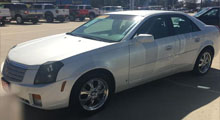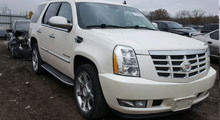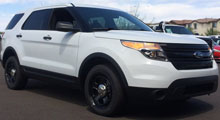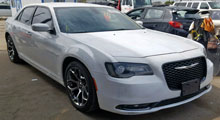Title Washed Cars
Shopping for used cars is always a gamble. There are so many things to consider and beware of when other drivers have used a car. How well was it maintained? On what type of terrain was it driven and how gently was it driven? We all hope for that used car with one previous owner, preferably a kind and gentle senior citizen. Unfortunately, that isn’t the case. One problem we all have to face with a used car is title washing. According to statistics from cars.com, one in every 350 cars has had it's title washed in the United States. Mississippi and New Jersey hold the record as the states with the most instances of this activity.
What is It?
When an insurance company deems a car to be a total loss, they issue it salvaged documentation, which means ownership papers have had a brand placed on it. This could mean the vehicle has been deemed unsaleable because of flood damage, being wrecked beyond repair, storm damage or the odometer has been tampered with to read untrue mileage. Unscrupulous car dealers will wash the salvage documentation to remove the unsaleable brand placed upon it by the insurance company. This can be done in a variety of ingenuitive ways. Sellers can transfer it to another state that is unfamiliar with the brand or alter it so the brand is unrecognizable. When the vehicle is issued new paperwork, there is no sign of the unsaleable brand or the damage the vehicle has sustained.
Flood Damage and other Storm Damage
Hurricanes Katrina, Sandy and Rita left more than 800,000 vehicles in an unsaleable state. A salvage declaration became a regular occurrence and those filing an insurance claim were doomed to lose money. Sellers of these cars take them to other states where laws are not as strict. States such a Pennsylvania, Ohio, and Florida have less trouble with this issue, reporting only one in a thousand or so salvage vehicles turning up. This practice affects almost 800,000 vehicles on United States roads. The damage done to these vehicles can come back to haunt unsuspecting drivers at any time.
Fraud and Federal Criminal Status
The FBI doesn’t take this practice lightly and has declared it corrupt and fraudulent. It is a federal crime in the United States. These branded cars are often moved to states that have different branding rules, such as states where cars over a certain age are exempt from branding. There are even states that do not have flood branding requirements at all.
Why Do People Do It?
It is all about making a buck. Salvagers buy these cars extremely cheap, or even steal them with the intention of selling them to triple their money. To do so, they must have clean ownership documents. So, they make, or wash, one. Some damaged cars have never had a brand or had an insurance claim filed. These are instances of brand avoidance, which is just as unscrupulous. These situations can bring even more money as it is harder to uncover the real damage. The National Salvage Vehicle Reporting Program blames some of this fraudulent activity on the insurers themselves. They report as much as 80% of the 3.5 million cars purchased at salvage auctions in the United States each year are furnished by the insurers.
Used cars branded as unrepairable must be scrapped for metal. The average price for a scrapped car is approximately $1200. Repairing the car, washing the documentation and putting them back in buyer rotation can bring as much as $2500 more. A revealing report from ABC news exposed such a scam when they purchased a Ford F-350 in New Jersey for $20,000 after Hurricane Sandy. Investigations uncovered evidence that the truck had been submerged in flood water for two days. The insurance company declared it a total loss but never issued a flood brand. While charges were brought against the dealership, the vast maze of ambiguities throughout the country’s various state titling laws paves the way for much branding avoidance.
How Can This Happen So Often?
Many states base their branding laws on non-testable, subjective criteria. Other states have removed the non-repairable brand requirement altogether. Older cars are much easier for insurance companies to write off as totaled because they are worth less. This being the case, many states do not require older cars to be branded when damaged. Over a dozen states have no official branding requirements at all.
What is Being Done to Prevent This Practice?
In 1992 and 1996, the Justice Department instated acts to limit this practice with a branding database called the National Motor Vehicle Title Information System. It is a national database of all vehicle brands. In 2010, the NMVTIS data was converted to an online accessible database at vehiclehistory.gov. The Justice Department mandates all states to report branding and all associated facts to the database. The database now has titling information for 87% of the cars on United States roads. Six states as well as the District of Columbia do not report the data to the National Motor Vehicle Title Information System.
How Can You Tell if a Salvage Title Has Been Washed?
The first step in determining if a car's documents have been washed is to order a vehicle history report. CarFax and AutoCheck are the two leading providers of this service. They both provide all brands listed in any state throughout the car's history. This is the first step to finding mismatched branding. If the brand was removed during a move to another state, these services will alert you. Unfortunately, there are still loopholes that these vehicles can slip through, even with a history report. Your next step is to have any used car you are potentially buying inspected by a licensed mechanic. A salvage title is a dangerous thing. The people who sell these types of cars have no qualms putting your life on the line. Some will go as far as stuffing newspapers in the airbag compartments and resealing them. You must take your safety into your own hands if you have even the smallest inkling the vehicle you are buying has had it's title washed.





